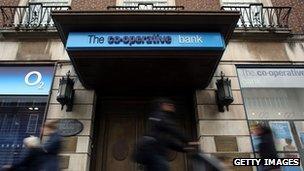Co-op Group appoints inquiry into bank failings
- Published

Co-op Group has to find £1.5bn to fund its bank
The Co-operative Group has appointed an independent inquiry into how the problems at the Co-op Bank came about, and why they took so long to emerge.
Earlier this year the group was ordered to raise £1.5bn of capital to bolster Co-op Bank's financial resilience.
The inquiry will look at key management decisions, external, including the acquisition of Britannia Building Society in 2009.
The BBC understands that the Co-op mulled handing control of the bank over to the Bank of England.
This would have been done as part of a formal "resolution" process - set up since the 2008 financial crisis - under which hefty losses would have been imposed on the Co-op Bank's lenders.
'Forensic look'
But the group decided the move could do too much damage to the Co-op brand.
Instead, it came up with a compromise plan to raise £1bn of the capital - which banks are required to hold in order to protect savers and depositors from losses - and another £500m by forcing losses onto holders of the Co-op Bank's debt.
The new inquiry into the events that led up to the bank's rescue will begin work in September, and report to the group's annual general meeting in May next year.
It will be headed by Sir Christopher Kelly, who was previously chairman of the Committee on Standards in Public Life, which advises the government on ethics, as well as of the Financial Ombudsman Service and the National Society for the Prevention of Cruelty to Children.
The inquiry has been set up by the Co-op's new board, and will look into the culture and decision-making of the previous management, as well as whether important financial information was withheld.
It will also consider any broader implications for the co-operative business model.
"We are today announcing the launch of an independent review which will take a detailed and forensic look at all the relevant events and issues," said Co-op chief executive Euan Sutherland.
Depositors protected
Implementation of the Co-op Bank's £1.5bn rescue plan may prove a complicated and lengthy procedure.
Owners of the bank's debt and preference shares will still be asked to cancel some of the money owed to them, in return for new ordinary shares in the bank.
"Co-op Group's management regarded heaping losses on the holders of subordinated debt and preference shares as fair, given that, if Co-op Bank were to go into resolution, these investors would almost certainly incur much bigger losses," said our business editor, Robert Peston.
The bank's bondholders - including holders of its subordinated debt - must give their formal consent to the deal, in the face of the potentially worse alternative of a full resolution process over which they would have no say.
Further pressure was applied to bondholders on Friday, when the Co-op announced that the Prudential Regulation Authority would not permit it to continue paying, external a discretionary 13% interest payment to subordinated debt holders until after the rescue plan had been implemented.
If all goes to plan the refinancing should be completed by mid-November.
There is concern that if the process drags on, depositors might become nervous and start leaving the bank.
The problems at Co-op Bank stem from its purchase of the Britannia Building Society in 2009, which turned out to have large amounts of bad debt.
The situation was made worse when the regulator imposed more demanding requirements on all banks for the amount of capital they have to hold in reserve.
- Published18 June 2013
- Published10 May 2013
- Published24 April 2013